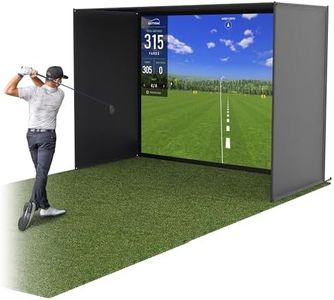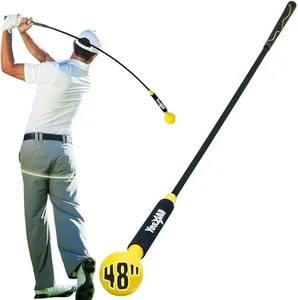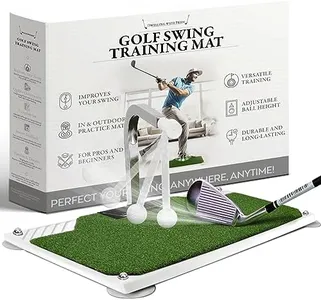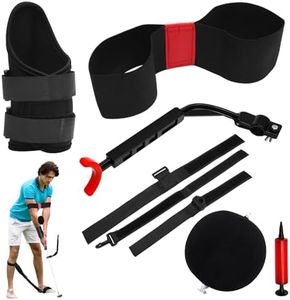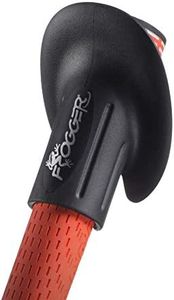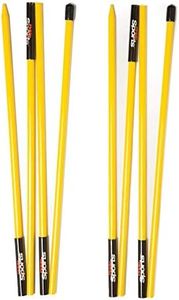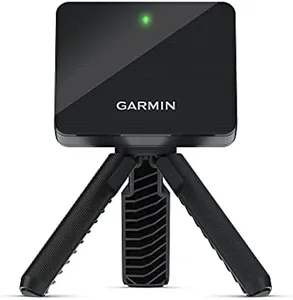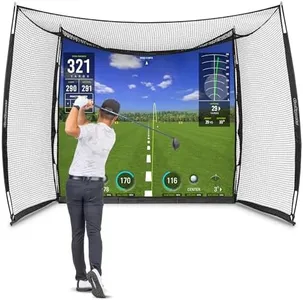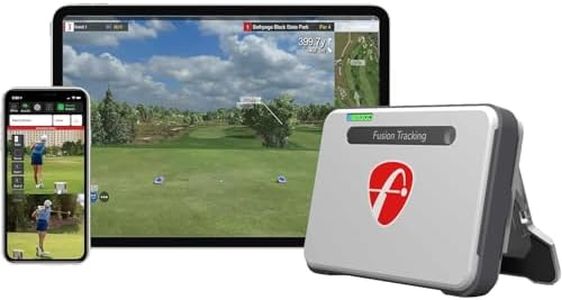10 Best Golf Simulators 2025 in the United States
Our technology thoroughly searches through the online shopping world, reviewing hundreds of sites. We then process and analyze this information, updating in real-time to bring you the latest top-rated products. This way, you always get the best and most current options available.

Our Top Picks
Winner
Garmin Approach® R50, Premium Golf Launch Monitor and Simulator, 10" Built-in Color Touchscreen Display
Most important from
14 reviews
The Garmin Approach R50 is a premium golf simulator that excels in several areas, making it suitable for both serious players and casual golf enthusiasts. One of its standout features is its accuracy, thanks to a sophisticated 3-camera system that tracks essential metrics like ball speed and launch angle. This precision can help users fine-tune their swings effectively. The built-in 10-inch color touchscreen provides an intuitive interface for accessing insights, selecting courses, and reviewing video feedback, enhancing the user experience.
In terms of software, the simulator offers access to over 43,000 courses and includes a social aspect with weekly tournaments and leaderboard functions, adding a fun competitive edge. The training mode is a valuable tool for tracking stats for each club and visualizing shot dispersion, which can greatly benefit players looking to improve their game.
Portability is another strong suit, as the Approach R50 is easy to carry and set up, making it a great choice for those who want to take it to the driving range. With up to four hours of battery life, it provides ample time for practice sessions. However, the need for a Garmin Golf membership to unlock full features and a subscription for certain functionalities might deter some users, as it adds an extra cost. While the simulator is durable, weighing 9 pounds, it may require a specific setup space to get the most out of its capabilities, which could be a limitation in smaller areas. The price point is on the higher side, which may not be suitable for every budget, particularly for beginners or those who play golf occasionally.
The Garmin Approach R50 is a robust option for serious golfers who prioritize accuracy and software features, but those on a tighter budget or seeking a more basic simulator might want to explore other alternatives.
Most important from
14 reviews
Rapsodo MLM2PRO Mobile Launch Monitor + Golf Simulator,Grey
Most important from
413 reviews
The Rapsodo MLM2PRO Mobile Launch Monitor is a solid choice for golf enthusiasts looking for a comprehensive simulation experience. Its dual optical camera and radar processing offer impressive accuracy, which is crucial for golfers aiming to fine-tune their skills. The system is designed for both indoor and outdoor use, making it versatile depending on your space requirements. With over 30,000 golf courses and two virtual ranges available, it provides a broad selection for practicing your swing.
One of the standout features is the new Target Range Play mode, which introduces unique targets, enhancing the fun and challenge of your practice sessions. Additionally, the 13 metrics it tracks, including spin rate and spin axis, are valuable for more serious golfers focused on improving their game.
On the portability front, the MLM2PRO is lightweight and comes with a carrying case, making it easy to transport. The quick connect feature is a plus, allowing users to set up faster and get straight to playing, which is a great convenience. There are some downsides to consider, such as the price being competitive for a high-quality golf simulator, which may still be a stretch for casual players or those just starting out. The resolution of the display is relatively low, which might not deliver the best visual experience for all users. Additionally, some users may find the software interface less intuitive at first, especially if they're not tech-savvy. The Rapsodo MLM2PRO is particularly beneficial for dedicated golfers who want a portable, accurate, and feature-rich simulator, but those looking for a more straightforward or budget-friendly option might want to explore other alternatives.
Most important from
413 reviews
GoSports 14 x 8 ft Golf Simulator Enclosure Net - Complete Set with Frame and HD Impact Screen Kit
Most important from
36 reviews
The GoSports 14 x 8 ft Golf Simulator Enclosure Net is a solid choice for golf enthusiasts who want to create an indoor golfing experience. One of its most notable strengths is its professional-grade setup, providing a generous 16:9 aspect ratio screen that allows for a realistic simulation of the game. The enclosure’s size—14 feet wide and 8 feet high—makes it suitable for various spaces, including garages and home offices, as long as the ceiling height is sufficient.
Durability is another strong point. Constructed from a sturdy steel frame and featuring a reinforced HD impact screen, it is designed to withstand real golf balls and various swing speeds. The addition of foam padding helps reduce the chances of the balls rebounding, which enhances safety during use.
The product is also compatible with all major launch monitors and projectors, giving users flexibility in their setup options. Furthermore, its installation process is straightforward, with the promise of being ready to use in about 30 minutes, making it accessible even for those who may not be particularly handy. While the enclosure is built to last, its large size may not be feasible for smaller living spaces, so potential buyers should carefully evaluate their room dimensions before purchase. Additionally, it does not include launch monitors or projectors, which can add to the overall cost if users need to purchase those separately.
Most important from
36 reviews
Buying Guide for the Best Golf Simulators
Choosing the right golf simulator can significantly enhance your practice sessions and overall enjoyment of the game. A golf simulator allows you to play and practice golf indoors, regardless of weather conditions. When selecting a golf simulator, it's important to consider several key specifications to ensure you get the best fit for your needs. Understanding these specs will help you make an informed decision and get the most out of your investment.FAQ
Most Popular Categories Right Now



